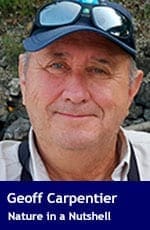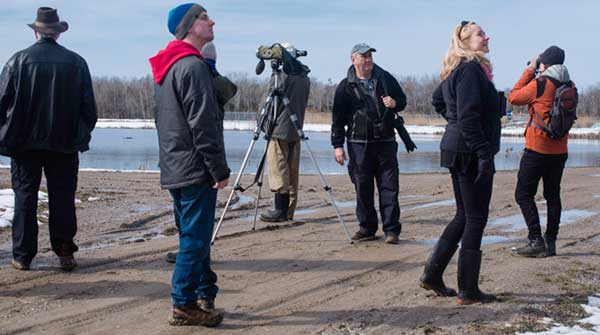Amateur and novice scientists collect the data the professionals use to monitor the environment
 At this time of year, once I reset my mind to celebrating the wonderful season of Christmas, with its remembrance of Christ, the amazing family interactions and the general great feeling it gives all of us, I think ahead to the promises I’ve made to various people and organizations.
At this time of year, once I reset my mind to celebrating the wonderful season of Christmas, with its remembrance of Christ, the amazing family interactions and the general great feeling it gives all of us, I think ahead to the promises I’ve made to various people and organizations.
I, of course, write this column with its inherent deadlines. I also craft two newsletters for local nature clubs, write book reviews, and am slowly working on my third book while preparing various lectures I’ve committed to for the coming year. Sigh – and who said retirement would be boring?!
However, the most time-consuming efforts I make are the various Citizen Science projects I am involved in.
 |
| Related Stories |
| Is nature really out to get us?
|
| How to be a better student of nature
|
| Elk thriving in Alberta |
The first of these citizen-driven projects is the Christmas Bird Counts (CBC), held annually across North America. Their purpose is to monitor the winter populations of birds to see how they’re doing – both at home and where they migrate for the winter. In January, I volunteer for a similar annual count – this one occurs along the shores of the Great Lakes in central Canada – and counts waterfowl to monitor and study their health. Are the numbers stable? Climbing or declining? Does the presence of Quagga and Zebra Mussels impact them? Positively or negatively? Is climate change affecting them?
Starting in November and running for 21 weeks, Project Feeder Watch monitors wintering avian populations over a more extended period to see how they’re faring. This is a more beneficial project than single-day events in some aspects because the variabilities of weather on a single day and volunteer participation are spread over time. Enthusiasm also remains higher. That said, this does not diminish the value of intense single-day surveys such as the CBCs.
So who does all this work? Well, we do! We are the amateur and novice scientists who make all this happen. We go out day after day and week after week to monitor what’s out there and report on it so that professional scientists and academia can use this data and draw valid and important conclusions about the health of our environment. Generally called Citizen Science, it is we, the citizens, who head out and scout the landscape, sometimes in organized groups and sometimes alone. We participate in specific projects and equally frequently on impromptu outings to check local hotspots and patches. The data we collect is invaluable.
My son coined the phrase “Power of the People” to describe what I do with my friends and colleagues. Although this phrase is usually connected to more profound earth-saving or fund-raising events, it seems appropriate to what we do. So all of you should get out there today and as many days as you can spare and see what you can do to help our avian, mammalian and reptilian friends.
Geoff Carpentier is a published author, expedition guide and environmental consultant. Visit Geoff on LinkedIn, Instagram and Facebook.
For interview requests, click here.
The opinions expressed by our columnists and contributors are theirs alone and do not inherently or expressly reflect the views of our publication.
© Troy Media
Troy Media is an editorial content provider to media outlets and its own hosted community news outlets across Canada.

